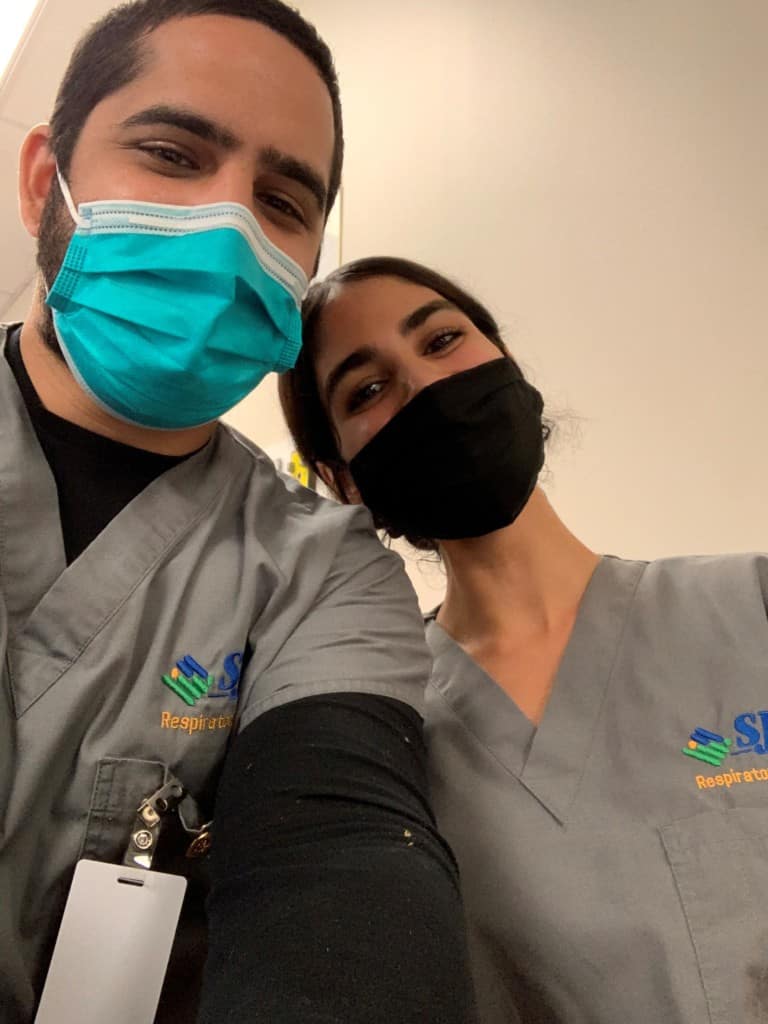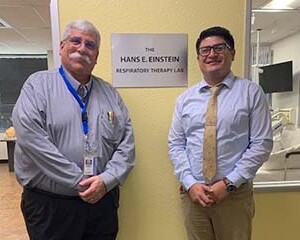Student Q&A with Respiratory Therapy student Yama Rustam
 Yama Rustam knew he wanted a profession that allowed him to immediately help others. After a bit of searching, he found the Respiratory Therapy program at San Joaquin Valley College.
Yama Rustam knew he wanted a profession that allowed him to immediately help others. After a bit of searching, he found the Respiratory Therapy program at San Joaquin Valley College.
Now in his fifth term, Yama recently encouraged his cousin, Tina to enroll in the Respiratory Therapy program as well; the two look forward to seeing each other on campus and supporting each other as they learn.
Yama will graduate in November of this year; along the way, he’s learned not only about respiratory therapy and how he can help others, but about what he can achieve when he puts no limits on his goals.
What did you do before enrolling in Respiratory Therapy (RT) program?
I was attending community college and working at Starbucks; I was going to school for psychology, and down the line that changed. I finished general education and kept changing my mind.
What made you want to study RT? Were you inspired by anything or anyone?
My sister and my brother-in-law are both nurses. One day they recommended I try nursing. They knew I liked science and was interested in a lot of different subjects, so they thought I’d be good at nursing—but I wasn’t really that interested in it. Then my sister told me about respiratory therapy, and when I did more research, I was really drawn to it.
My grandpa, who’d had a quarter of his lung removed, was on oxygen, and I remember the times the home RT visited; they helped him live. They made him more comfortable. They were there for him, and one of the things I want most in life is to be there for and to help people. Seeing someone close to me getting that help had an impact on me.
I genuinely care about others’ wellbeing. I knew I wanted to be in the medical field, and I knew I wanted to do something hands-on to help people. Respiratory Therapists help people on the spot, they have the skills to help them feel better immediately; I love that about the profession.
How has it been for you to do the program with your cousin?
I love being at school with my cousin! We are close; we’re first cousins. Everyone these days is so busy, so our family doesn’t see each other regularly in person, so every time I see her on campus, it gives me happiness. School can be a stressful place, fast-paced and chaotic, but then I see her and crack a joke and it really lightens my day and rejuvenates me. I’m three terms ahead of her, so sometimes I give her heads up about what is coming.
What has been your favorite part of the program so far? What has been the most challenging?
My favorite part so far is the instructors. They are great: inspiring, intelligent, and insanely smart. The first two terms when it’s all new—a new language and a new world—they’re there for you to help you through it.
The most challenging part for me was being online for some of the classes, and then being in lab once a week for hands-on learning. Being on Zoom was strange—it was difficult to be online. I’m not a techy person, and it’s too easy to be distracted at home. When we were finally in person, it was like we didn’t know how to be in class with other people. We had been complaining, but once we were in class, it was really an adjustment and kind of stressful.
Another challenge was finding time for family; we find joy in our family, and we are there for family and extended family, and not being able to have that flexibility was hard.
How did you get through the challenging times?
I had to just have 100 percent acceptance about the situation: we had to be online, there was no choice. I set my goal to complete the program, hold my chin high, make the best of it, and then graduate and get my license.
I will say, this program challenges not just my ability to learn but also myself; I learned that whatever you are thinking, you are capable of doing. You find out that if you feel limited, you are the only one limiting yourself. There were the little lessons I learned along the way and applied overall to myself.
Do you have any thoughts or words of advice to share with someone who is just beginning the program?
Don’t be so hard on yourself; be patient with yourself. Sometimes I like talking to myself as if I were talking to someone else—how would I advise a loved one? What would I say to myself? Be compassionate with yourself—if you don’t get something right away, give yourself grace.
Read Our Career Guide On Respiratory Therapy
Respiratory therapists care for individuals affected by respiratory diseases, like asthma and COPD, and other causes of breathing difficulties.
You might also like
More stories about
Request Information
All fields using an asterik (*) are required.


